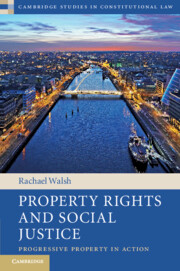Book contents
- Property Rights and Social Justice
- Cambridge Studies in Constitutional Law
- Property Rights and Social Justice
- Copyright page
- Dedication
- Contents
- Acknowledgements
- 1 Progressive Property in Action
- 2 Understanding Progressive Property
- 3 Property as Ideology, Individual Right, and Institution
- 4 Engaging Constitutional Property Rights
- 5 Standards of Review and the Form of Constitutional Property Rights
- 6 Adjudicating Fairness
- 7 Security of Possession in a Progressive Constitutional Context
- 8 Security of Value in a Progressive Constitutional Context
- 9 Learning from Progressive Property in Action
- Bibliography
- Cases
- Index
- Cambridge Studies in Constitutional Law (continued from page ii)
7 - Security of Possession in a Progressive Constitutional Context
Published online by Cambridge University Press: 28 May 2021
- Property Rights and Social Justice
- Cambridge Studies in Constitutional Law
- Property Rights and Social Justice
- Copyright page
- Dedication
- Contents
- Acknowledgements
- 1 Progressive Property in Action
- 2 Understanding Progressive Property
- 3 Property as Ideology, Individual Right, and Institution
- 4 Engaging Constitutional Property Rights
- 5 Standards of Review and the Form of Constitutional Property Rights
- 6 Adjudicating Fairness
- 7 Security of Possession in a Progressive Constitutional Context
- 8 Security of Value in a Progressive Constitutional Context
- 9 Learning from Progressive Property in Action
- Bibliography
- Cases
- Index
- Cambridge Studies in Constitutional Law (continued from page ii)
Summary
This chapter explores the question of a 'public purpose' requirement for the taking of property, and the nature of any 'right to keep' as an incident of ownership, through the prism of Irish constitutional property law. It illustrates how the progressively framed Irish constitutional property clauses have translated into a weak public purpose requirement that retains flexibility for the elected branches of government to determine that deprivation of property is warranted in a wide range of circumstances. It draws lessons from Irish constitutional property law for progressive property attempts to address the 'public purpose' question in ways that both preserve the State's ability to acquire or abrogate property rights in the public interest and protect owners' and their communities against unfair exploitation.
Keywords
- Type
- Chapter
- Information
- Property Rights and Social JusticeProgressive Property in Action, pp. 164 - 196Publisher: Cambridge University PressPrint publication year: 2021

